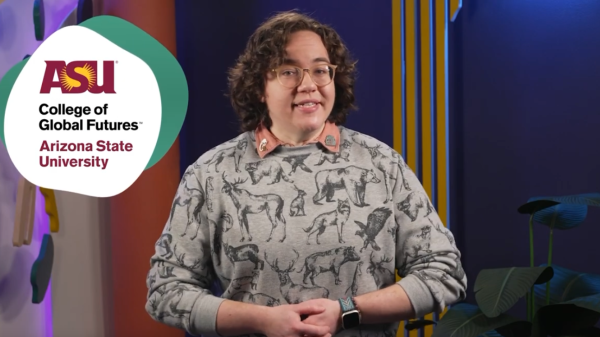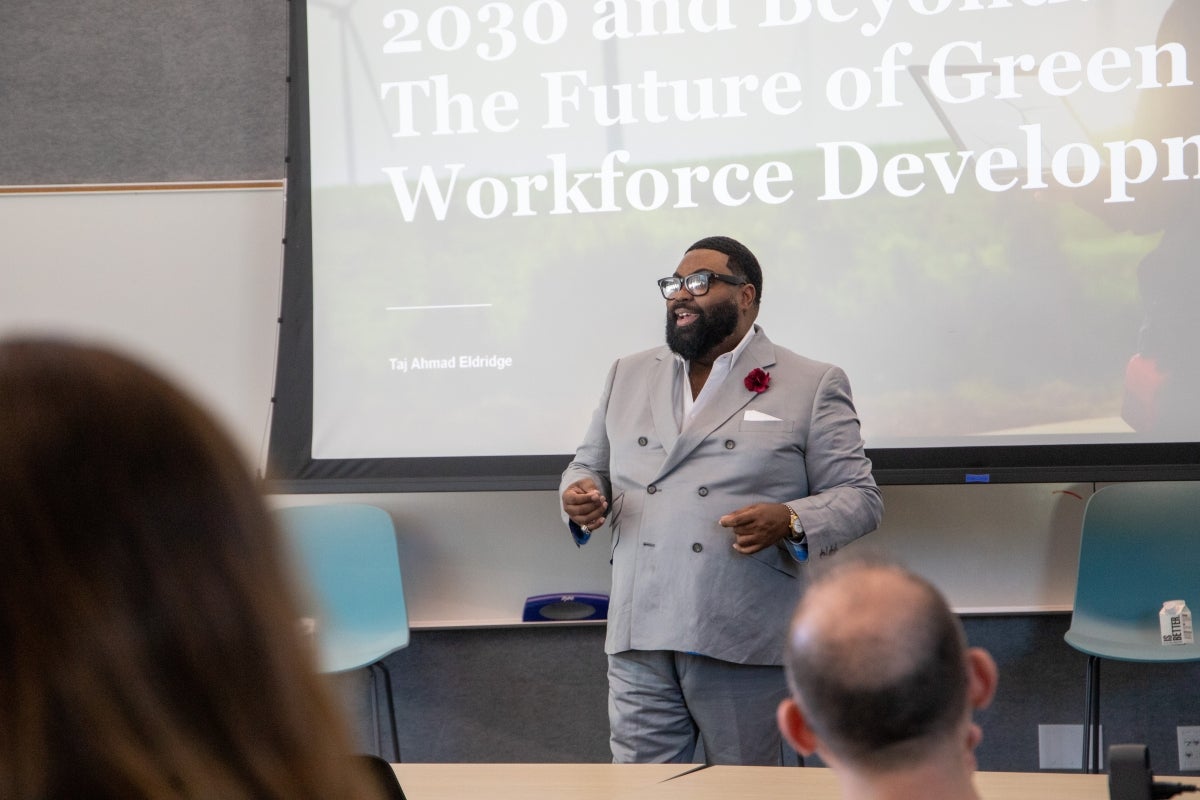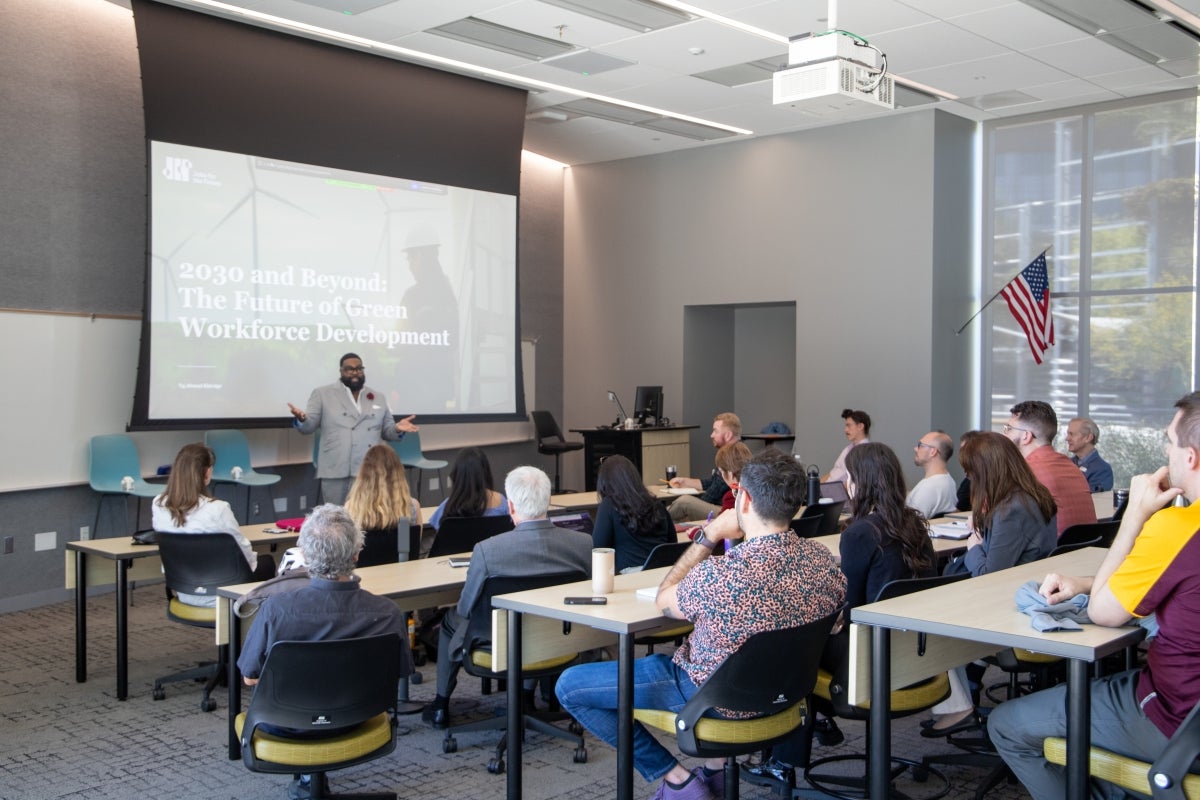ASU event discusses hopeful future for a decarbonized economy

From left: Christopher Boone, José Lobo, Taj Ahmad Eldridge and Julie Stiak during a panel discussion for 2030 and Beyond: The Future of Green Workforce Development, hosted by ASU's College of Global Futures. Photo courtesy the College of Global Futures
The economic landscape and jobs market are changing faster than ever, with cutting-edge technologies, workplace adaptations and evolving industries driving the need for transformation across the board.
The United Nations has acknowledged this with its adoption of the 2030 Agenda for Sustainable Development, and LinkedIn data in the World Economic Forum’s Future of Jobs report showed that, since 2019, the green jobs hiring rate consistently outpaced the overall hiring rate globally four years in a row.
To address these global concerns, Arizona State University’s College of Global Futures co-hosted an event with Jobs for the Future (JFF) that included a talk, panel discussion and Q&A.
2030 and Beyond: The Future of Green Workforce Development was held April 3 at the Walton Center for Planetary Health on ASU's Tempe campus. The event attracted attendees, from college students to community members and sustainability professionals, who attended both in person and virtually.
Taj Ahmad Eldridge, managing director of Climate Innovation at JFFLabs, led a talk on the green workforce landscape over the next decade, during which he highlighted Climate-Resilient Employees for a Sustainable Tomorrow (CREST), an initiative funded by the Ares Charitable Foundation that aims to to close the gap between the demand for a skilled workforce for green jobs and the number of people prepared for them.
Eldridge has more than 25 years of experience in investment, entrepreneurship, climate and workforce development. Before joining JFFLabs, he co-founded Include Venture Partners, where he focused on investing in a diverse group of founders and fund managers who wanted to create innovative ecosystems in their areas. Before that, he was senior director of investments at Los Angeles Cleantech Incubator.
“A lot of times when we think about the green economy, we think about clean tech, or we think about sustainability, our visions are narrowed,” Eldridge said. “I want to open the aperture as we talk about opportunities in green jobs for the future beyond 2030.”
Eldridge said that climate jobs are extremely diverse, and there are opportunities for students in every major to contribute to the green economy in different ways. He emphasized that the idea of diversity in green job opportunities goes beyond traditional considerations of race and gender. He also touched on the importance of geographic locations and educational attainment in finding and creating job opportunities in the climate space, encouraging collaboration between universities, businesses and nonprofit organizations.
Following his talk, Eldridge was joined by School of Sustainability Professors Christopher Boone and José Lobo for a panel discussion moderated by Julie Stiak, the district director of workforce education for Maricopa Community Colleges.
Boone said that there is a growing demand for a green workforce, and organizations “are not going to move the needle until we link livelihoods to these principles and ideas.”
“The good news is that there are more sustainability and green jobs than there are qualified people to fill them. This is not just in the U.S.; this is worldwide,” Boone said.
Lobo provided a global perspective on the green economy, highlighting research with statistical inconsistencies about corporations' “green” efforts, and political and economic impacts from energy transformation in various countries around the world.
“There is a growing research agenda nationally and internationally about who wins, who loses and who is affected,” Lobo said.
Viewing sustainability opportunities from a global standpoint is important because “we cannot just solve the climate crisis in the U.S. and say we are done,” Eldridge said.
The panelists pointed out that opportunities for green jobs are diverse because any job can be a green job when it is relevant to the U.N.’s 17 Sustainable Development Goals.
“We need to better communicate that those opportunities are there, that the world doesn’t have to come to an end; you can actually play a role in making sure that it doesn’t,” Boone said. “You can also earn a livelihood while you are doing that as well. It’s not just about sacrifice.”
More Environment and sustainability

Floods linked to rise in US deaths from several major causes
New research, co-authored by Arizona State University Assistant Professor Aaron Flores and published in Nature Medicine, uncovers a concerning link between severe flooding and increased…

ASU partners with education production company to share research with online learners
Through Arizona State University’s partnership with Complexly education production company, the online educational initiative Study Hall has forged a new pathway for students to earn college credits…

First-year students get immersive cultural, sustainability lessons in Costa Rica
Studying abroad can be a life-changing experience for any student, let alone a new student who just completed their first semester in college.That's what more than 50 Arizona State University…


